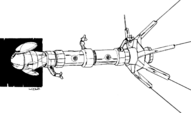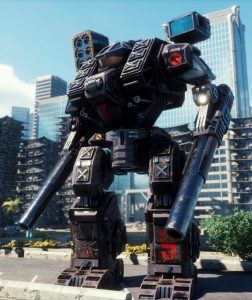Monolith

| |
| Monolith-class JumpShip | |
|---|---|
| Production information | |
| Manufacturer | Challenge Systems[1]
|
| Use | Military |
| Tech Base | Standard |
| Cost | 1,000,000,000 C-Bills |
| Introduced | 2776 |
| Technical specifications | |
| Mass | 430,000 tons |
| Length | 750 meters |
| Sail Diameter | 1270 meters |
| Fuel | 68 tons (170) |
| Burn Rate | 39.52 |
| Top Thrust | 0.1 Gs |
| Sail Integrity | 5 |
| KF Drive Integrity | 8 |
| LF Battery | None |
| Armament | None |
| Armor | 150 tons |
| DropShip Capacity | 9 |
| Crew | 30[5][6]
(Crew Types)[7]
Bay Personnel: 30[5] |
| Grav Decks | 2 x 105 meters diameter |
| Escape Pods/Life Boats | 5/0 |
| Heat Sinks | 137 (single) |
| Structural Integrity | 1 |
| BV (1.0) | 1,041[9] |
| BV (2.0) | ??? |
Contents
Description[edit]
In terms of sheer tonnage, the Monolith is the largest class of civilian JumpShip ever built; at 750 meters from fore to aft it is also the longest. Other than its sheer size, another distinctive trait is a unique system of docking collars mounted on arms. These docking arms are arranged in three groups that form rings down the vessel's spine. These arms enable the Monolith to accommodate even the largest DropShips. Furthermore, with a total of nine docking collars it can accommodate more DropShips than any other civilian JumpShip.[5][10]
The Monolith's command center is equipped with the latest communication, analysis, and simulation equipment. As a result of this superb facility, many Monoliths serve as flagships for invasion fleets and coordinate operations until command is passed to a DropShip in orbit around the target world. The Monolith is also more heavily armored than other JumpShips, but it is still utterly defenseless if engaged in combat. Finally, the ship is equipped with two large 105-meter grav decks.[5][10]
Armament[edit]
The Monolith is completely unarmed, although two of the six Small Craft bays are sometimes used to accommodate fighters. In general, a Monolith relies upon its DropShips for protection, as well as the Inner Sphere custom of not attacking JumpShips.
Cargo[edit]
The standard Monolith has six Small Craft bays, and older publications described it as being able to carry 7000 tons of cargo. However, this capacity is incorrect under the current construction rules, which leaves the Monolith with only about 1,457.5 tons of dedicated cargo.
The Monolith was also described as having extra tanks for fueling DropShips or aerospace fighters on extended campaigns. However, as equipped under the current ruleset, the Monolith only has a capacity for some 70 tons of fuel, which is barely enough for its own operation. That being said, it would presumably be straightforward to convert some of its cargo bay capacity into additional fuel storage.
In any event, these discrepancies may be viewed as legacy errors from earlier rulesets when JumpShip construction rules were not yet fully fleshed out, if at all.
Variants and other apocryphal errors[edit]
Although no major variants are known, there are significant differences among the various sources describing the Monolith owing to the inconsistent, contradictory, and often erroneous application of different rulesets at different times.
Its stated mass was retconned from originally 380,000 tons to 430,000 tons because of a construction rule that was introduced after the specifications of the Monolith, which limits docking hardpoints to one per 50,000 tons of mass, rounded up; under that rule, a 380,000-ton vessel would only be allowed to mount a maximum of 8 hardpoints. Technical Readout: 3057 Revised officially altered the Monolith's mass, and the Master Unit List similarly lists it at 430,000 tons. It is thus doubtful whether a 380,000-ton version canonically existed in the BattleTech universe. (The JumpShip Rubicon, for example, is both expressly described as a Monolith class vessel and as massing 380,000 tons in canon.)
Technical Readout 3057 mentions the 7000-ton cargo capacity but states a mere 37 tons in the ship's stats table, presumably in error. It also gives the number of heat sinks as 140 as opposed to 137 as per the BattleSpace rulebook.
Number in service[edit]
Prohibitive manufacturing and maintenance costs have kept the number of operating ships down, but their sturdiness and an abundant supply of spare parts ensure that they remain in service.
There are notable discrepancies, however, in reports about how many Monolith class vessels actually exist. As of 3025 and also 3057, the armies of the Successor States between them supposedly operated less than 50 Monoliths, half of which served with the DCMS. Despite assertions to the contrary, it is demonstrably untrue that only the militaries of the Great Houses employed the design in these eras, as both mercenary units and various mercantile corporations are also known to operate Monoliths.[11]
The stated number of "a few dozen"[10] or "less than fifty" vessels is also at odds with the known production numbers and the stated sturdiness and longevity of the vessels.[12] Furthermore, this estimate seems to disregard the number that may or may not have been in service with ComStar (an omission which was probably intentional on ComStar's part).
The Federated Suns was reportedly constructing two vessels every three years, presumably via Challenge Systems on Panpour,[13][14] while the Free Worlds League historically produced one every two years. The FWLM had potentially lost this capability, with no known facilities in 3025. The Draconis Combine was also reported as unable to produce the class in 3025, even though it maintained almost half of the "known" Monoliths;[10] by the time of the Clan War the Stellar Trek shipyards at Chatham would eventually take up new Monolith production.[2][3]
The Clans also operate the Monolith class and have upgraded it with their own advanced technologies. It is not known how many Clan Monoliths exist, but it should be noted that the design was only introduced eight years prior to Aleksandr Kerensky's Operation EXODUS. Only a dozen Monoliths had been produced by that time, suggesting that a very small number of these vessels would have joined the Exodus fleet, and most are reported to have been constructed in the Pentagon worlds or Kerensky Cluster.[5] There is insufficient information on production capacities in the Clan homeworlds to estimate how many, if any, have been built there since.
For all the reasons stated above it seems almost certain that the "50 ship" figure is a significant underestimate.
See Also[edit]
Gallery[edit]
Original Monolith from DropShips and JumpShips
Monolith from TRO:3057
A Monolith in combat from Jihad: Final Reckoning
References[edit]
- ↑ 1.0 1.1 1.2 DropShips and JumpShips: ComStar Intelligence Summary, p. 15
- ↑ 2.0 2.1 Handbook: House Kurita, p. 162: "Pillar of Jade (Economics) - Direct Service (Military) Corporations - Stellar Trek Enterprises"
- ↑ 3.0 3.1 Objectives: Draconis Combine, p. 8: "Produced Components on Chatham"
- ↑ Objective Raids, p. 68: "Stellar Trek Profile and Produced Components
- ↑ 5.0 5.1 5.2 5.3 5.4 Technical Readout: 3057 Revised, p. 106, "Monolith JumpShip Profile"
- ↑ BattleSpace sourcebook, p. 53
- ↑ BattleSpace rulebook, p. 63
- ↑ DropShips and JumpShips: ComStar Intelligence Summary, p. 25
- ↑ AeroTech 2 Record Sheets, p. 277
- ↑ 10.0 10.1 10.2 10.3 DropShips and JumpShips: ComStar Intelligence Summary, p. 24
- ↑ According to the Wolf's Dragoons sourcebook, p. 6, Wolf's Dragoons had at least two Monoliths when they first appeared in the Inner Sphere in 3005. As of 3025, the Synguard Corporation, a medium-sized mercantile corporation, was mentioned to operate three Monoliths in MechWarrior (1st Edition), p. 109. The Mercenary Handbook, p. 74, lists three Monoliths with the mercenary Eridani Light Horse as of 3025. Finally, at least two named Monoliths, the Edinborough Express and the Spirit of Edinburgh, served with the Northwind Highlanders as of 3067 and have implicitly been with them for a long time.[citation needed]
- ↑ See Essay:JumpShip distribution
- ↑ Handbook: House Davion, p. 165, "Challenge Systems Profile"
- ↑ Objectives: Federated Suns, p. 28, "Industrial Systems"
Bibliography[edit]
- AeroTech 2 Record Sheets
- BattleSpace
- DropShips and JumpShips
- Handbook: House Davion
- Handbook: House Kurita
- MechWarrior: The BattleTech Role Playing Game
- Mercenary's Handbook
- Objective Raids
- Objectives: Draconis Combine
- Objectives: Federated Suns
- Technical Readout 3057
- Technical Readout: 3057 Revised
- Wolf's Dragoons





